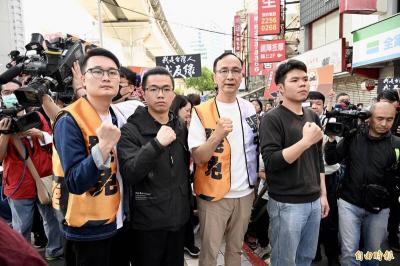The number of foreign visitors to the nation last month rose about 2 percent from a year earlier, reversing a decline recorded in the previous three months, the Tourism Bureau said on Friday.
The number of foreign visitors totaled 926,813 last month, up 1.81 percent from a year earlier, the bureau said.
That compares positively with a decline in the January-to-March period, when the number of foreign arrivals fell 9.99 percent annually.
The rebound in foreign arrivals was in part caused by a sharp increase in the number of visitors from Hong Kong, reaching 190,785, an increase of 110,716 people, or 72.32 percent, from a year earlier, the bureau said.
The increase was attributed to a holiday late last month, the bureau said, adding that the government has also introduced incentives to attract visitors from Hong Kong, such as offering one free airfare for every three tickets purchased to Taiwan.
The number of visitors from South Korea and Southeast Asia also rose, the bureau said.
The number of South Korean visitors totaled 84,249, an increase of more than 20,000, or 34.44 percent, from a year earlier, while the number of visitors from Vietnam soared 151.6 percent from last year to about 30,000, the bureau said.
The number of visitors from Thailand and the Philippines doubled, increasing by more than 10,000 visitors from a year earlier, the bureau said.
The Democratic Progressive Party (DPP) government last year launched its “new southbound policy” that seeks closer ties with ASEAN members, as well as India, Pakistan, Bangladesh, Nepal, Sri Lanka, Bhutan, Australia and New Zealand, to reduce economic dependence on China.
The government has granted visa-free travel to people from Thailand and Myanmar, while giving conditional visa-free privileges to visitors from the Philippines.
The number of Japanese visitors last month fell 2.13 percent from a year earlier to 126,712, as a weaker yen dampened interest in overseas travel, the bureau said.
Although the number of Chinese visitors last month fell 42.97 percent from the previous year to 214,196, they remained the largest group of foreigners visiting Taiwan, the bureau said.

The Ministry of Economic Affairs has fined Taobao NT$1.2 million (US$36,900) for advertisements that exceeded its approved business scope and ordered the Chinese e-commerce platform to make corrections in the first half of this year or its license would be revoked. Lawmakers have called for stricter supervision of Chinese e-commerce platforms and more stringent measures to prevent China from laundering its goods through Taiwan as US President Donald Trump’s administration cracks down on origin laundering. The legislature’s Finance Committee yesterday met to discuss policies to prevent China from dumping goods in Taiwan, inviting government agencies to report on the matter. Democratic Progressive Party

Taiwan and its Pacific ally Tuvalu on Tuesday signed two accords aimed at facilitating bilateral cooperation on labor affairs, according to Taiwan’s Ministry of Foreign Affairs (MOFA). The governments inked two agreements in Taipei, witnessed by Foreign Minister Lin Chia-lung (林佳龍) and visiting Deputy Tuvaluan Prime Minister Panapasi Nelesone, MOFA said in a news release. According to MOFA, the agreements will facilitate cooperation on labor issues and allow the two sides to mutually recognize seafarers’ certificates and related training. Taiwan would also continue to collaborate with Tuvalu across various fields to promote economic prosperity as well as the well-being of their

The Taipei District Prosecutors’ Office has continued its investigation into allegations of forged signatures in recall efforts today by searching the Chinese Nationalist Party’s (KMT) city chapter and questioning several personnel including the chapter director, according to media reports. Among those questioned and detained were KMT Taipei chapter director Huang Lu Chin-ju (黃呂錦茹), chapter secretary-general Chu Wen-ching (初文卿), chapter secretary Yao Fu-wen (姚富文) and first district committee executive director Tseng Fan-chuan (曾繁川). Prosecutors said they would not confirm reports about who had been summoned. The investigation centers on allegations that the ongoing recall campaigns targeting Democratic Progressive Party legislators Rosalia Wu (吳思瑤)

Several Chinese Nationalist Party (KMT) officials including Chairman Eric Chu (朱立倫) are to be summoned for questioning and then transferred to prosecutors for holding an illegal assembly in Taipei last night, the Taipei Police said today. Chu and two others hosted an illegal assembly and are to be requested to explain their actions, the Taipei City Police Department's Zhongzheng (中正) First Precinct said, referring to a protest held after Huang Lu Chin-ju (黃呂錦茹), KMT Taipei's chapter director, and several other KMT staffers were questioned for alleged signature forgery in recall petitions against Democratic Progressive Party (DPP) legislators. Taipei prosecutors had filed